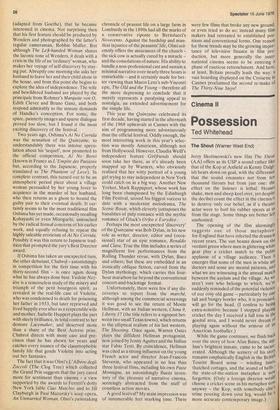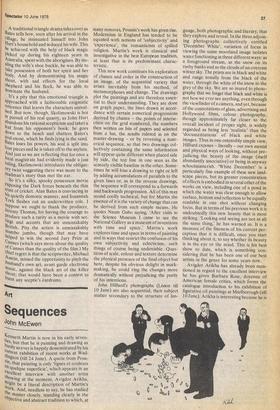Cinema II
Possession
Ted Whitehead
The Shout (Warner West End) Jerzy Skolimowski's new film The Shout (AA) offers as its USP a sound rather like that of the Kop at Anfield as Kenny Dale ish bears down on goal, with the difference that the sound emanates not from ten thousand throats but from just one: the effect on the listener is lethal. Houses shake, men and sheep keel over, yet despite the decibel count the effect in the cinema Is to destroy only our belief, as if a theatre actor were to hurl his rubber spears at us from the stage. Some things are better left unshouted.
The opening of the film alarminglY suggests one of those metaphors' for-England that have infected the drama10 recent years. The sun beams down on the verdant green where men in glittering white gear play a cricket match to the politC applause of a village audience. Then 0 emerges that some of the men in white are doctors and some are mental patients, and what we are witnessing is the annual match between the asylum and the village. As we aren't sure who belongs to which, we're suddenly reminded of the potential violence of our cosy old game —, particularly by one tall and hungry bowler who, it is promised, will go for the head. (I confess to being extra-sensitive because I stopped playing cricket the day I received a full toss in the, genital area, and I would never dream °I playing again without the armour of 50 American footballer.) While the game continues, we flash bad' over the story of how Alan Bates, the or lum's brightest inmate, came to be incare: erated. Although the scenery of his star) remains emphatically English in the British Tourist Board sense — winding lanes, thatched cottages, and the sound of bells"' the state-of-the-nation metaphor is noW forgotten. (Only a foreign director would choose a cricket scene as his metaphor nO, anyway — the Kop, with somebody else urine pouring down your leg, would be ° more accurate contemporary image.) A traditional triangle drama takes over as Bates tells how, soon after his arrival in the village, he insinuated himself into John Hurt's household and seduced his wife. This he achieved with the help of black magic Picked up during his eighteen years in Australia, spent with the aborigines. By stealing the wife's shoe buckle, he was able to take possession of both her spirit and her body. And by demonstrating his magic shout, with sad effects for the local Shepherd and his flock, he was able to dominate the husband.
It's a pity that this emotional triangle is approached with a fashionable enigmatic reticence that leaves the characters unrealised. But now, though, Skolimowski is hot in pursuit of his real quarry, as John Hurt abandons his rational scepticism and takes a leaf from his opponent's book: he goes down to the beach and shatters Bates's soul-stone, which he finds lying in the sand. Bates loses his powers, his soul is split into four pieces and he is taken off to the asylum. And just as we are reflecting that for once a local magistrate had evidently made a just ruling, Skolimowski introduces the obligatory twist suggesting there was more to the madman's story than met the ear.
So it's a silky, spooky possession movie exposing the Dark forces beneath the thin crust of cricket. Alan Bates is convincing in hiS quietly demonic manner, and Susannah York fleshes out an underwritten role. I
saPPose we ought to thank the producer,
Jeremy Thomas, for having the courage to produce such a rarity as a movie with set tings and accents that are unmistakably
British. Pity the action is unmistakably RI, Limbo jumbo, though that may have _gelPed to win the second Jury Prize at
LEtnnes (which says more about the quality of Cannes than the quality of the film.) My Chief regret is that the scriptwriter, Michael
Austin, missed the opportunity to pitch the husband's own art, avant garde electronic Music, against the black art of the killer shout; that would have been a contest to burst any sceptic's eardrums.



































 Previous page
Previous page